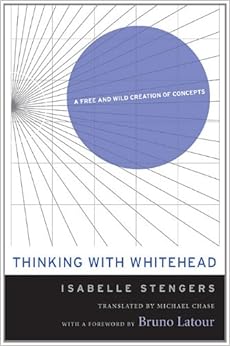"My readers have now been warned. If they are fascinated by the heroic grandeur of refusal, and despise compromises; if they deplore the fact that the radical demands of every new position are recuperated by what was supposed to be subverted; if 'to deconstruct' is a goal in itself for them, and scandalizing self-righteous people is a testimony to truth; if they oppose the pure to the impure, the authentic to the artificial; if they cannot understand how the most 'unplatonic' of philosophers situated himself as a 'footnote' to the text of Plato ... let them close this book. Never will they see celebrated in it the power of a truth that is verified by the destruction of false pretenders. They will therefore find in it only disappointments and reasons for contempt." (Thinking With Whitehead, p.275-6)And slightly different in French:
"Le lecteur est maintenant prévenu. Si, comme le Belzébuth mis en scène par Leibniz dans Confessio philosophi, dont la rage se déchaîne à l'offre de salut, il est fasciné par la pureté du refus et méprise les compromis, s'il déplore que les exigences radicales de toute position nouvelle se monnaient progressivement en contrastes enrichissant ce qu'il s'agissait de subvertir, s'il ne peut comprendre que le plus « non platonicien » des philosophes se soit situé lui-même comme « note en bas de page » au texte de Platon... qu'il referme ce livre. Jamais il n'y verra célébré le pouvoir d'une vérité qui se vérifie par la destruction de faux prétendants. Il n'y trouvera donc que déceptions et raisons de mépris." (Penser Avec Whitehead, p.310)This is my third attempt to read this book and it's the first time that I am sure that I will reach the end. It is not that it is a 'difficult' book as such. Stengers, in her own inimitable way, writes with extraordinary precision. However, being something of an autodidact with respect to philosophy, I wasn't quite ready for such a dense and demanding text in the past.
 It is a work that requires a very particular routine of reading. It cannot be read casually, put down and picked up a week or two later (not usefully, anyhow). At over 500 pages it is not something that can be read in one sitting, or several sittings, either. (There is no quick way through such a text—the whole point is that the reader slows down.) It requires, for me at least, extreme attention and focus. It's not something that I am able to read except when at my most clear headed, and then for a few hours at a time. Unfortunately, there aren't many windows like that in my week (I hope that soon this will change). I, out of necessity, do most of my own reading and research in the evenings—not a time of day conducive to this kind of endeavour.
It is a work that requires a very particular routine of reading. It cannot be read casually, put down and picked up a week or two later (not usefully, anyhow). At over 500 pages it is not something that can be read in one sitting, or several sittings, either. (There is no quick way through such a text—the whole point is that the reader slows down.) It requires, for me at least, extreme attention and focus. It's not something that I am able to read except when at my most clear headed, and then for a few hours at a time. Unfortunately, there aren't many windows like that in my week (I hope that soon this will change). I, out of necessity, do most of my own reading and research in the evenings—not a time of day conducive to this kind of endeavour. Nevertheless, I am gradually working my way through the book—one immersion at a time—and it is most certainly worth the effort. It's the kind of book that, after having read it, I will never be able to read any other book in the same way again. It neither condescends to its reader nor indulges in unnecessary dissimulation. It attempts to be clear but, at the same time, transformative. This time around, I am finding that it succeeds in both respects. Again, I find that the best words for it are: precise but, at the same time, extraordinarily dense. It is the most exquisitely constructed thicket.
Nevertheless, I am gradually working my way through the book—one immersion at a time—and it is most certainly worth the effort. It's the kind of book that, after having read it, I will never be able to read any other book in the same way again. It neither condescends to its reader nor indulges in unnecessary dissimulation. It attempts to be clear but, at the same time, transformative. This time around, I am finding that it succeeds in both respects. Again, I find that the best words for it are: precise but, at the same time, extraordinarily dense. It is the most exquisitely constructed thicket.There is far, far too much in this book to even begin to summarise or select. However, I find the above quotation(s) to be a perfect signal of its tone and intentions. This dissuasion addressed directly to the reader is at the same time reassuring—I am assured that none of the things described appeal to me (and their sirenic allure is further muted with each and every passing page).